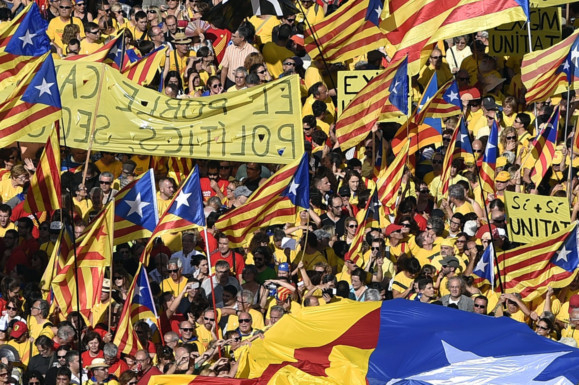
Barcelona: Catalonia is poised to call on Monday an early regional election that will serve as a proxy vote on independence from the rest of Spain, raising tensions with the central government in Madrid.
Catalan president Artur Mas will sign a decree setting September 27 as the date for the vote in the wealthy northeastern region, which is home to 7.5 million people and accounts for a fifth of Spain’s output.
If an alliance of pro-secession parties wins a majority, they will aim to split from Spain within 18 months, despite Madrid’s opposition, Mas has said.
The regional government has already started setting up institutions of state, which would swing into gear if the pro-independence camp wins.
“We are ready,” Mas repeatedly says during public appearances.
Last week, Catalan officials presented plans for a future Catalan tax agency and adopted a decree paving the way for a public credit institution to be turned into a Catalan central bank.
The issue of Catalan independence has been thrust onto the back burner in recent months, with Prime Minister Mariano Rajoy’s government more focused on the challenge in a year-end general election from new anti-austerity party Podemos than from Catalan separatists.
But the issue bounced back into the political spotlight in July after parties seeking independence for Catalonia set aside their differences and agreed to run on a joint ticket in the regional polls.
The joint list, called “Together for yes”, includes Mas’s conservative nationalist CDC party, the left-wing separatist ERC party and influential associations which have in recent years organised massive pro-independence demonstrations in the region.
A smaller far-left party supporting independence, CUP, has refused to join the alliance but could prove key to achieving the majority in the regional assembly which the pro-independence camp says would be sufficient to implement its secession plans.
Spain’s central government vows to oppose Catalonia’s moves.
“There will be no independence for Catalonia,” Rajoy told a news conference on Friday.
During a visit to Catalonia last month, King Felipe VI warned Catalan leaders that “respect for the law is the source of legitimacy and an unavoidable requirement for living together democratically in peace and freedom.”
Several members of Rajoy’s cabinet have raised the possibility of invoking article 155 of the constitution, which allows Madrid to supersede the authority of a regional government that is acting outside the law.
The separatists have warned that if the government uses this article, they will declare unilateral independence.
“There is no turning back,” said Raul Romeva, a former Green European Parliament member who was picked to head the “Together for yes” list to send a message that the secession movement cuts across political lines.
The movement appeared to lose steam after the Catalan regional government staged a symbolic independence referendum on November 9, despite having been blocked by the courts from going ahead with the exercise.
Polls showed that for the first time since 2011 support for Catalonia remaining a part of Spain surpassed support for independence.
But the pro-independence list has turned the situation around and its opponents are clearly worried.
“These are the most important [Catalan] regional elections in history,” said Xavier Garcia Albiol, the top regional candidate of the conservative Popular Party, which rules at the national level.
“The debate is not if the Catalan parliament should be from the left or right, what is important is that those who want Catalonia to remain in Spain obtain a majority,” he added.
Writing in El Pais daily, Albert Rivera, leader of the centre-right party Ciudadanos which is staunchly opposed to Catalan separatism, said a victory for the pro-unity camp was vital “in order to create a new majority”.
Such a majority would require an unlikely alliance between the Popular Party, Ciudadanos, the Socialists and the Christian Democrat party UDC, which in June ended a 37-year alliance with Mas’s party due to differences over the independence issue. It would also require the backing of a left-wing platform set up by Podemos.
With two months to go until the elections, support for the two camps seems evenly split.
“There is a social majority in favour of unity, but it is not mobilised and lacks cohesion. The separatists could win,” said Nacho Martin Blanco, a political analysts and commentator with conservative daily ABC.












